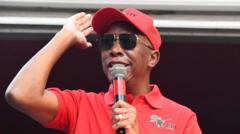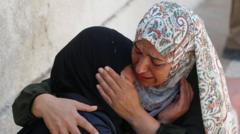South African politician Julius Malema has been banned from entering the UK for comments deemed "non-conducive to the public good," including support for Hamas and calls for violence against white South Africans. His party, the Economic Freedom Fighters, has condemned the UK’s decision as an infringement on democratic discourse.
UK Bans South African Politician Julius Malema Over Controversial Statements

UK Bans South African Politician Julius Malema Over Controversial Statements
The UK Home Office identifies Julius Malema as a threat to public order, citing his inflammatory rhetoric.
South African political figure Julius Malema is facing significant repercussions as the UK Home Office has declared him a threat to public order, resulting in an entry ban to the United Kingdom. Known for his radical stances and inflammatory rhetoric, Malema, the leader of the Economic Freedom Fighters (EFF), was refused entry on grounds that he is "non-conducive to the public good."
The decision follows his blatant support for Hamas after the October 7 attacks, wherein he controversially stated that his party would arm the group if given the chance. Additionally, his past remarks threatening the "slaughter of white people" and calls to "take up arms" were highlighted as factors justifying the ban. The UK government emphasized that Malema posed an undesirable influence in the UK.
The EFF swiftly condemned the ruling, labeling it as an act of "cowardice" that undermines democratic engagement and debate. This marks the second time Malema has encountered obstacles concerning his UK entry, with the previous instance attributed to a late application. A British official in South Africa indicated that this current ruling is a decisive outcome, meaning he has no right of appeal and may face future entry denials.
As a well-known figure in South African politics who gained significant media attention, including a mention by former President Donald Trump, Malema continues to polarize opinions domestically and internationally. The fallout from this situation reflects the complex intersection of race, politics, and migration policies on a global scale.




















